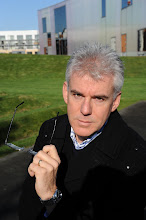Dispatches: In God’s Name reveals that a surprising level of ignorance shapes the way religion is portrayed on television.
Twenty-five years ago, as a post-graduate research student, I undertook a study of the portrayal of religion on television, and an examination of the relationship between the churches and the broadcasting institutions. What I discovered was that what had once been a fairly cosy association, was becoming less so. On the one hand there was a degree of suspicion among the churches in general, and the evangelical community in particular, who felt they were misunderstood and misrepresented by the media. On the other hand was a surprising level of ignorance of their subject on the part of many programme-makers, even those producing religious programmes.
This week’s Dispatches (Channel 4: May 19th 2008) confirmed that, in the course of the past two and a half decades, this gulf seems only to have widened. In God’s Name (www.youtube.com/watch?v=TeTfW8-dCNE) set itself up to be ‘a journey through British Christian fundamentalism’. The journey turned out to be a limited one consisting of three stops. First-up was Bristol-based Carmel, a fundamentalist church with its own attached independent school which uses American curriculum material. We also met one of the church’s members, 29-year-old David Pearce, a driving instructor, who believes homosexuality is an abomination, and sex outside marriage is sin. Second was Steven Green (aka ‘Christian Voice’), who has enjoyed an extraordinary level of attention since his protests outside the theatres playing Jerry Springer: The Opera caught the interest of the media. Here he was given yet more air time to expound his offensive and reactionary views at length. And third in line was Andrea Williams, public policy director of the Lawyer’s Christian Fellowship. She has been actively campaigning for reform of the abortion laws, taking the Pro-Life position that unborn life is sacred from conception. She also believes that Islam is a ‘false religion, as many things in this world are false’, and most surprisingly, that the world could be as young as 4000 years.
From this three-strand narrative, filmmaker David Modell, weaves his central premise: that fundamentalism is an extreme and dangerous religious movement (‘the potential of this movement is formidable…’); that it is growing at an alarming rate (‘radical Christianity has spread throughout the country…’); and that it has designs on Parliament and the courts to enforce its fundamentalist will on the population (‘…Britain’s Christian fundamentalists could just be beginning to exercise their power’).
On all three counts, Modell is simply wrong. First, fundamentalist Christians in the UK do not represent a coherent movement at all, but are a loose association (if even that), of the more conservative members of the evangelical wings of a number of different Christian denominations. Secondly, there is no evidence to support the assertion that Christian fundamentalism is growing in the UK. (On the contrary, anecdotal evidence indicates the opposite may be so.) To claim, as the programme did, that ‘figures suggest that this movement numbers as many as two million people in the UK’ is patently inaccurate – the entire Evangelical Movement (of which fundamentalists would constitute only a part) is no greater than this figure. Thirdly, it is this very consciousness of being a diminishing and sidelined minority that drives people of Christian fundamentalist views to attempt to find recourse in law - as one protester on the film is heard to shout, ‘…no one has respect any more for Christianity!’ It’s an essentially defensive position, combined with a prevailing idea that the law is somehow rooted in a more conservative, more Christian era, and as such, can help defend ‘Christian values’ against the erosion of permissiveness and the sands of time.
None of this seems to have been understood by the filmmaker. In consequence, each of Modell’s three stories was shoe-horned into the single and relentless theme that had presumably been determined at the time the film was commissioned. The main casualty of this disingenuous approach was probably Andrea Williams. Despite her shaky ideas about the age of the earth, nothing she was engaged in was outside the normal activities of any political lobbyist in Westminster. Yet meetings with Tory MP Nadine Dorries, and Tory peer Norman Tebbit, were presented as an extraordinary level of access to ‘power’ (despite Miss Dorries’ understandable amusement at the suggestion).
Fundamentalism is a difficult but extremely important subject, and the need for real understanding of the way in which religious ideas and experience play out in ordinary people’s lives has never been more urgent. Yet television – which is uniquely placed to provide this kind of insight - will only do so when commissioning editors ensure that their programmes move beyond the simplistic and sensational. In God’s Name singularly failed to do that, presenting unsympathetic and ridiculous-sounding people as a kind of incomprehensible and dangerous freak show. As a glance at some of the blogs and online discussions prompted by the show reveals, the programme produced a predictable torrent of hostility, vitriol and outrage. If this was its purpose, it achieved its end. But as a contribution to an understanding of religious extremism, it was a singular failure and another missed opportunity on the part of Channel 4.
Friday, 23 May 2008
Subscribe to:
Comments (Atom)
